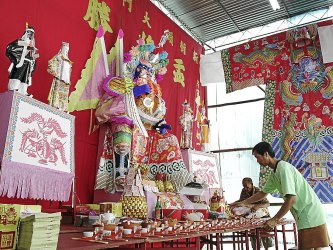Hungry Ghost Festival

The Hungry Ghost Festival is one of five major Chinese observances. Hungry Ghost
Festival falls on the 7th moon, 15th day of the Chinese Lunar Calendar. The
build up to this festive date begins roughly a week before. Chinese Opera's and
Chinese Puppet Shows are put together for audiences - the living and the
non-living alike, at Temples and certain Chinese Associations for a week prior
to the big day.
The Hungry Ghost Festival has roots in the Buddhist festival, Ullambana, and
also Daoist culture. In the Tang Dynasty, the Ullambana and Daoist festivities
were combined and celebrated on the same day. The Ghost Festival has special
meaning for all Buddhists and is one of their most important festivals.
These performances are more rampant in towns and villages that are more Chinese
(as in race) dominated, like in Penang, Perak , Malacca etc. With this in mind,
the Hungry Ghost Festival not only pays homage to ancestors but to all other
neglected souls roaming in between worlds. Just as most would not invite a
beggar into their homes, the same goes for spiritual beggars. Food for these
homeless souls are placed outside and sometimes prayer sessions are conducted.
The feast usually consist of a variety of meat and delicacies. Some believers
even lay out cigarettes, beer etc for them.
At the Lim Jetty,
Penang elaborate floats take to the streets during the Hungry Ghost
Festival while stage performances are held for the wandering spirits and
deities.
Prayers are offered to the dead and offerings of food such as chicken,
vegetables, fruits, bean curd, white rice, bowls of noodles, sweetmeats, cakes
and other treats are placed at street corners and along roadsides to appease the
spirits. You will find food offerings on street corners all over Penang during
the Hungry Ghosts Month. The Chinese leave these offerings to discourage the
Ghosts from entering their homes and causing trouble or bringing bad luck.
Shrines are filled with offerings to the dead, Hell money is burned to provide
ancestors with means to purchase comforts. The Chinese also burn paper houses,
Hell passports and Hell airline tickets, paper television sets and paper cars
such as BMW’s to give to their dead relatives. Some families feel that these
offerings reach the ghosts and help them live comfortably in the afterlife.
During the “Hungry Ghost Month” children and young toddlers are kept inside,
especially at night, for fear of them being led away by the “Hungry Ghosts”.
Having a wedding or moving house is considered bad luck and going to the beach
and swimming is discouraged because many tragedies have taken place in the sea,
and evil ghosts may be eager to take more lives! The 30th day of the seventh
moon is the last day of the festival. At midnight, the ghosts return to Hell and
the gates are shut after them. Paper offerings and other goods are burnt in a
giant bonfire as a final gift.
undo Malaysian Festivals